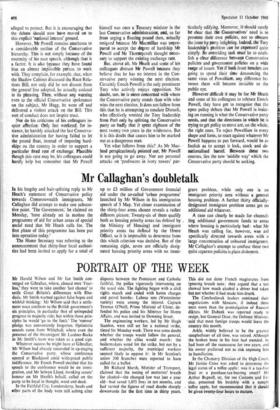PORTRAIT OF THE WEEK
Mr Harold Wilson and Mr Ian Smith con- verged on Gibraltar, where, aboard HMS 'Fear- less,' they were to take another 'last chance' to settle Great Britain's differences with Rho- desia. Mr Smith warned against false hopes and wishful thinking: Mr Wilson said that a settle- ment must conform to the British government's six principles, in particular that of unimpeded progress to majority rule; but within those prin- ciples he would `go to the limit.' The `NIBMAR. pledge was conveniently forgotten. Optimistic sounds came from Whitehall, where even the presence of the intransigent Mr Lardner-Burke in Mr Smith's team was taken as a good sign.
Whatever success he might have at Gibraltar, Mr Wilson had already succeeded in up-staging the Conservative party, whose conference opened at Blackpool amid widespread public indifference. Mr Enoch Powell decided that his speech to the conference would be on immi- gration, and Mr Selwyn Lloyd, invoking scouts' honour on Mr Heath's behalf, called on the party to be loyal in thought, word and decd.
In the Faithful City, Londonderry, heads and other parts of the body were still aching after
disputes between the Protestant and Catholic faithful, the police vigorously intervening on the usual side. The fighting began with a civil rights march and ended with baton charges and petrol bombs: Labour MPS (Westminster variety) were among the injured. Captain Terence O'Neill, Prime Minister of Ulster, de- fended his police and his Minister for Home Affairs, and was invited to Downing Street.
The engineering workers, led by. Mr Hugh Scanlon, were still set for a national strike, timed for Monday week. There was some doubt whether the troops would follow the general, and whether the allies would march: the boilermakers voted fdr the strike, but not by a sufficient majority, the municipal workers seemed likely to oppose it: in Mr Scanlon's union 300 branches were reported to have called for a ballot.
Mr Richard Marsh, Minister of Transport, claimed that the testing of motorists' breath for alcohol—the changed law was just a year old—had saved 1,075 live.; in ten months, and had turned the figures of road deaths sharply downwards for the first time in thirty years.
This did not deter French magistrates from ignoring breath tests: they argued that a test showed how much alcohol a driver had taken but not whether it had made him drunk.
The Czechoslovak leaders continued their negotiations with Moscow, if indeed, these were more than the promulgation of Russian diktats. Mr Dubcek was - reported • ready to resign, but General Dzur. the Defence Minister, 'said that most foreign troops would leave the country this month.
Arkle, widely believed to be the greatest steeplechaser of all time, was retired. Although the broken bone in his foot had mended. he had been off the racecourse for two years. and his owner preferred not to risk exposing him to humiliation.
In the Chancery Division of the High Court, Mr Justice Cross was asked to determine the legal status of a toffee apple: was it a tax-free fruit or a purchase-tax-bearing sweet? Mr Arthur Bagnall, QC, for um Customs and Ex- cise, presented his lordship with a sample toffee apple, but recommended that it should be given twenty-four hours to mature.






































 Previous page
Previous page